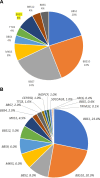Spectrum of pathogenic variants and high prevalence of pathogenic BBS7 variants in Russian patients with Bardet-Biedl syndrome
- PMID: 39092430
- PMCID: PMC11291329
- DOI: 10.3389/fgene.2024.1419025
Spectrum of pathogenic variants and high prevalence of pathogenic BBS7 variants in Russian patients with Bardet-Biedl syndrome
Abstract
Introduction: Bardet-Biedl syndrome is a rare condition characterized by obesity, retinitis pigmentosa, polydactyly, development delay, and structural kidney anomalies. This syndrome has an autosomal recessive type of inheritance. For the first time, molecular genetic testing has been provided for a large cohort of Russian patients with Bardet-Biedl syndrome.
Materials and methods: Genetic testing was provided to 61 unrelated patients using an MPS panel that includes coding regions and intronic areas of all genes (n = 21) currently associated with Bardet-Biedl syndrome.
Results: The diagnosis was confirmed for 41% of the patients (n = 25). Disease-causing variants were observed in BBS1, BBS4, BBS7, TTC8, BBS9, BBS10, BBS12, and MKKS genes. In most cases, pathogenic and likely pathogenic variants were localized in BBS1, BBS10, and BBS7 genes; recurrent variants were also observed in these genes.
Discussion: The frequency of pathogenic and likely pathogenic variants in the BBS1 and BBS10 genes among Russian patients matches the research data in other countries. The frequency of pathogenic variants in the BBS7 gene is about 1.5%-2% of patients with Bardet-Biedl syndrome, while in the cohort of Russian patients, the fraction is 24%. In addition, the recurrent pathogenic variant c.1967_1968delinsC was detected in the BBS7 gene. The higher frequency of this variant in the Russian population, as well as the lack of association of this pathogenic variant with Bardet-Biedl syndrome in other populations, suggests that the variant c.1967_1968delinsC in the BBS7 gene is major and has a founder effect in the Russian population. Results provided in this article show the significant role of pathogenic variants in the BBS7 gene for patients with Bardet-Biedl syndrome in the Russian population.
Keywords: BBS genes; BBSome; Bardet–Biedl syndrome; ciliopathies; rare diseases.
Copyright © 2024 Orlova, Gundorova, Kadnikova and Polyakov.
Conflict of interest statement
The authors declare that the research was conducted in the absence of any commercial or financial relationships that could be construed as a potential conflict of interest.
Figures
Similar articles
-
Targeted multi-gene panel testing for the diagnosis of Bardet Biedl syndrome: Identification of nine novel mutations across BBS1, BBS2, BBS4, BBS7, BBS9, BBS10 genes.Eur J Med Genet. 2015 Dec;58(12):689-94. doi: 10.1016/j.ejmg.2015.10.011. Epub 2015 Oct 27. Eur J Med Genet. 2015. PMID: 26518167
-
Bardet-Biedl Syndrome Overview.2003 Jul 14 [updated 2023 Mar 23]. In: Adam MP, Feldman J, Mirzaa GM, Pagon RA, Wallace SE, Amemiya A, editors. GeneReviews® [Internet]. Seattle (WA): University of Washington, Seattle; 1993–2025. 2003 Jul 14 [updated 2023 Mar 23]. In: Adam MP, Feldman J, Mirzaa GM, Pagon RA, Wallace SE, Amemiya A, editors. GeneReviews® [Internet]. Seattle (WA): University of Washington, Seattle; 1993–2025. PMID: 20301537 Free Books & Documents. Review.
-
Mutations in chaperonin-like BBS genes are a major contributor to disease development in a multiethnic Bardet-Biedl syndrome patient population.J Med Genet. 2010 Jul;47(7):453-63. doi: 10.1136/jmg.2009.073205. Epub 2010 May 14. J Med Genet. 2010. PMID: 20472660
-
Genetic characterization of Italian patients with Bardet-Biedl syndrome and correlation to ocular, renal and audio-vestibular phenotype: identification of eleven novel pathogenic sequence variants.BMC Med Genet. 2017 Feb 1;18(1):10. doi: 10.1186/s12881-017-0372-0. BMC Med Genet. 2017. PMID: 28143435 Free PMC article.
-
Bardet-Biedl Syndrome as a Chaperonopathy: Dissecting the Major Role of Chaperonin-Like BBS Proteins (BBS6-BBS10-BBS12).Front Mol Biosci. 2017 Jul 31;4:55. doi: 10.3389/fmolb.2017.00055. eCollection 2017. Front Mol Biosci. 2017. PMID: 28824921 Free PMC article. Review.
References
-
- Beskorovayniy N. S., Beskorovaynaya T. S. (2024). NGSData.
Grants and funding
LinkOut - more resources
Full Text Sources



